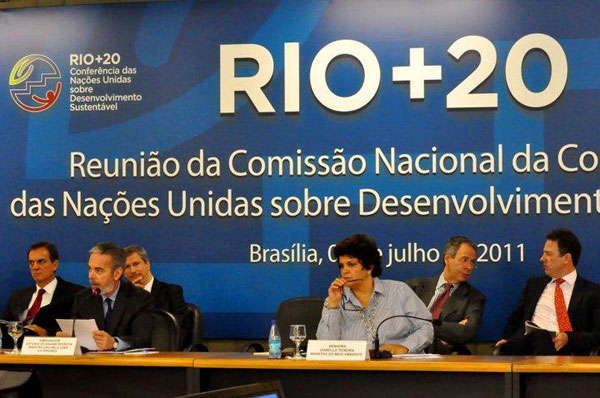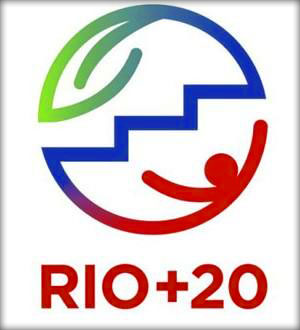Reply To:
Name - Reply Comment
Last Updated : 2024-05-05 10:54:00
 By Asoka Abeygunawardana
By Asoka Abeygunawardana
_DM-9_02-2.jpg) The United Nations Conference on Sustainable Development (UNCSD) in 2012 - also referred to as ‘Rio+20’ seeks three objectives: securing renewed political commitment to sustainable development, assessing the progress and implementation gaps in meeting already agreed commitments, and addressing new and emerging challenges. The Member States have agreed on the following two themes for the Conference: a green economy within the context of sustainable development and poverty eradication and an institutional framework for sustainable development.
The United Nations Conference on Sustainable Development (UNCSD) in 2012 - also referred to as ‘Rio+20’ seeks three objectives: securing renewed political commitment to sustainable development, assessing the progress and implementation gaps in meeting already agreed commitments, and addressing new and emerging challenges. The Member States have agreed on the following two themes for the Conference: a green economy within the context of sustainable development and poverty eradication and an institutional framework for sustainable development..jpg)
_DM-9_02-3.jpg) At present species are becoming extinct at the fastest rate known in geological history and most of these extinctions are tied to human activity. Experts estimate that the world is losing 137 plant, animal and insect species every single day due to rainforest deforestation. That equates to 50,000 species a year. Global deforestation sharply accelerated around 1852. It has been estimated that about half of the Earth’s mature tropical forests of the original 15 - 16 million square kilometres that until 1947 covered the planet, have now be destroyed. Some scientists have predicted that by 2030 there will only be 10% remaining with another 10% in a degraded condition. 80% of forest cover would, by then, be lost, and with them, hundreds of thousands of irreplaceable species. The global Living Planet Index (LPI) has declined by more than 30% since the UN conference in 1972, suggesting that on average, vertebrate populations fell by nearly one-third during that period. The Tropical LPI shows a sharper decline of almost 60%.
At present species are becoming extinct at the fastest rate known in geological history and most of these extinctions are tied to human activity. Experts estimate that the world is losing 137 plant, animal and insect species every single day due to rainforest deforestation. That equates to 50,000 species a year. Global deforestation sharply accelerated around 1852. It has been estimated that about half of the Earth’s mature tropical forests of the original 15 - 16 million square kilometres that until 1947 covered the planet, have now be destroyed. Some scientists have predicted that by 2030 there will only be 10% remaining with another 10% in a degraded condition. 80% of forest cover would, by then, be lost, and with them, hundreds of thousands of irreplaceable species. The global Living Planet Index (LPI) has declined by more than 30% since the UN conference in 1972, suggesting that on average, vertebrate populations fell by nearly one-third during that period. The Tropical LPI shows a sharper decline of almost 60%. Climate change is putting even more pressure on the resources humankind depends on. Energy is central to everything in modern civilisation and the discussion in 1992 was to reduce CO2 emitting fossil fuels use and find alternative ways of meeting the increasing demand for energy. However since 1992 annual global fossil oil consumption has increased by 25% and coal consumption by 50% increasing annual Carbon Dioxide emissions by 40%. As a result, the global average CO2concentration in the atmosphere which was only 275 ppm pre-industrial era, increased to 320ppm in 1972, to 350 ppm in 1992 and to 395 ppm in 2012. This year the Arctic concentration reached the 400 ppm mark.
Climate change is putting even more pressure on the resources humankind depends on. Energy is central to everything in modern civilisation and the discussion in 1992 was to reduce CO2 emitting fossil fuels use and find alternative ways of meeting the increasing demand for energy. However since 1992 annual global fossil oil consumption has increased by 25% and coal consumption by 50% increasing annual Carbon Dioxide emissions by 40%. As a result, the global average CO2concentration in the atmosphere which was only 275 ppm pre-industrial era, increased to 320ppm in 1972, to 350 ppm in 1992 and to 395 ppm in 2012. This year the Arctic concentration reached the 400 ppm mark._DM-9_02-1.jpg) The phrase “Green economy” itself is one that can be easily misused. The terms ‘Green economy’ and ‘green jobs’ can be used for promoting unsustainable life styles. It is entirely probable that after another ten years the world’s leaders may have to gather and try to find out where they went wrong.
The phrase “Green economy” itself is one that can be easily misused. The terms ‘Green economy’ and ‘green jobs’ can be used for promoting unsustainable life styles. It is entirely probable that after another ten years the world’s leaders may have to gather and try to find out where they went wrong.
Add comment
Comments will be edited (grammar, spelling and slang) and authorized at the discretion of Daily Mirror online. The website also has the right not to publish selected comments.
Reply To:
Name - Reply Comment
US authorities are currently reviewing the manifest of every cargo aboard MV
On March 26, a couple arriving from Thailand was arrested with 88 live animal
According to villagers from Naula-Moragolla out of 105 families 80 can afford
Is the situation in Sri Lanka so grim that locals harbour hope that they coul

03 May 2024